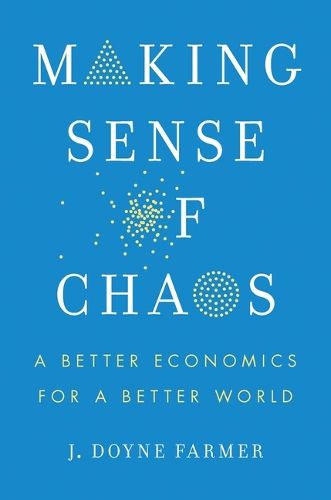Readings Newsletter
Become a Readings Member to make your shopping experience even easier.
Sign in or sign up for free!
You’re not far away from qualifying for FREE standard shipping within Australia
You’ve qualified for FREE standard shipping within Australia
The cart is loading…






From a pioneer in the field of complexity science and chaos theory, a plan for solving the world's most pressing problems "Farmer convincingly argues that by using big data and today's more powerful computers, we can build more realistic models and simulations of the global economy. . . . Farmer's vision will undoubtedly be significant in how economics evolves."--Tej Parikh, Financial Times, "Best New Books on Economics"
"Both a manifesto for a revolution in economics and a memoir of an unusual career."--Ed Ballard, Wall Street Journal
We live in an age of increasing complexity--an era of accelerating technology and global interconnection that holds more promise, and more peril, than any other time in human history. The fossil fuels that have powered global wealth creation now threaten to destroy the world they helped build. Automation and digitization promise prosperity for some, unemployment for others. Financial crises fuel growing inequality, polarization, and the retreat of democracy. At heart, all these problems are rooted in the economy, yet the guidance provided by economic models has often failed.
Many books have been written about J. Doyne Farmer and his work, but this is the first in his own words. It presents a manifesto for how to do economics better. In this tale of science and ideas, Farmer fuses his profound knowledge and expertise with stories from his life to explain how we can bring a scientific revolution to bear on the economic conundrums facing society.
Using big data and ever more powerful computers, we are now able for the first time to apply complex systems science to economic activity, building realistic models of the global economy. The resulting simulations and the emergent behavior we observe form the cornerstone of the science of complexity economics, allowing us to test ideas and make significantly better economic predictions--to better address the hard problems facing the world.
$9.00 standard shipping within Australia
FREE standard shipping within Australia for orders over $100.00
Express & International shipping calculated at checkout
From a pioneer in the field of complexity science and chaos theory, a plan for solving the world's most pressing problems "Farmer convincingly argues that by using big data and today's more powerful computers, we can build more realistic models and simulations of the global economy. . . . Farmer's vision will undoubtedly be significant in how economics evolves."--Tej Parikh, Financial Times, "Best New Books on Economics"
"Both a manifesto for a revolution in economics and a memoir of an unusual career."--Ed Ballard, Wall Street Journal
We live in an age of increasing complexity--an era of accelerating technology and global interconnection that holds more promise, and more peril, than any other time in human history. The fossil fuels that have powered global wealth creation now threaten to destroy the world they helped build. Automation and digitization promise prosperity for some, unemployment for others. Financial crises fuel growing inequality, polarization, and the retreat of democracy. At heart, all these problems are rooted in the economy, yet the guidance provided by economic models has often failed.
Many books have been written about J. Doyne Farmer and his work, but this is the first in his own words. It presents a manifesto for how to do economics better. In this tale of science and ideas, Farmer fuses his profound knowledge and expertise with stories from his life to explain how we can bring a scientific revolution to bear on the economic conundrums facing society.
Using big data and ever more powerful computers, we are now able for the first time to apply complex systems science to economic activity, building realistic models of the global economy. The resulting simulations and the emergent behavior we observe form the cornerstone of the science of complexity economics, allowing us to test ideas and make significantly better economic predictions--to better address the hard problems facing the world.